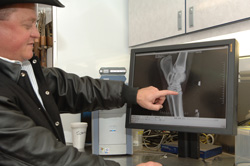If you have to find a vet referral on your own (or wish to change your primary practitioner), use a combination of the following resources to search out the right vet for your horse’s particular needs. No single source is perfect, but together they can help you.

DiscoverHorses.com. The “Resources” section of this comprehensive website (created by a partnership of which Horse & Rider is a member) includes contact information for members of the American Association of Equine Practitioners (AAEP). Go directly to the vet-contact section via DiscoverHorses.com/resources/dvm.
American Association of Equine Practitioners. AAEP can provide you with a helpful list of veterinary colleges (more about these, below). Most likely, they’ll refer you to “Get-A-DVM,” directly below. Phone: 859-233-0147; fax 859-233-1968; address: 4075 Iron Works Parkway, Lexington, KY 40511; website: aaep.org.
Get-A-DVM. This helpful service is provided through a partnership between AAEP (above) and Bayer Animal Health. You can use search engines on both organizations’ websites to find a list of AAEP-member vets (and their specialties/services) in your area. Go to aaep.org (homepage, click on “Horse Owners” link in the middle of the page). Or call AAEP at 800-443-0177; email them at aaepoffice@aaep.org.
Local/regional vet school. AAEP can provide you with a list of schools nearest to you. Ask to speak to a veterinarian who specializes in the area of your horse’s problem (such as a lameness expert, an eye specialist, etc.). You can then ask to make an appointment with him or her. If the vet school is too far away to be practical, call and say, “I live in Timbuktu. My horse is having such-and-such a problem, and I’m looking for a second opinion. Could you please direct me to some veterinarians in my area?” With any luck, someone at the school can help.
Network. Ask respected local horse people for suggestions. Word of mouth can be a valuable tool in your search. But keep in mind it can also act as a filter. For instance, someone you know may have used a referral vet with whom he or she didn’t establish a positive relationship. Though the horse may have received satisfactory treatment, your acquaintance’s dislike of the vet’s “stall-side manner” may have discolored his or her opinion. You’ll need to screen out the personality issues and focus on whether the information and treatment provided was good.
Google. Use your Internet search engine. Input the key words equine veterinarian, plus the specialty you’re seeking (such as ophthalmology), plus your state or region. This shotgun approach can take you directly to veterinarian and veterinary-school websites, plus their contact information. (Keep in mind, though, that such a search can be self-limiting; not all vets have websites.) You can then “vet” the vets you find via word of mouth (and perhaps check with AAEP).
Lasting Words of Wisdom
Once you do find a vet you believe can help in your horse’s situation, never hesitate to.
Speak up! One key to getting the best care for your horse is to actively participate in his case. This means you must strive to communicate with your veterinarian. Asking these five questions can help you measure progress (and help you decide whether another opinion may be warranted):
- How soon should I expect to see improvement?
- How will I know whether this treatment is working? I’d like specific signposts, please.
- Are there other treatments I should consider?
- If the problem recurs, what does mean?
- Are you comfortable with my horse’s progress? Why or why not? If you’re not, what action plan do you suggest?
For more help, see “Second Opinion?” in the May 2010 issue of Horse & Rider. To order a copy of this issue or other back issues, call 877-717-8928.






